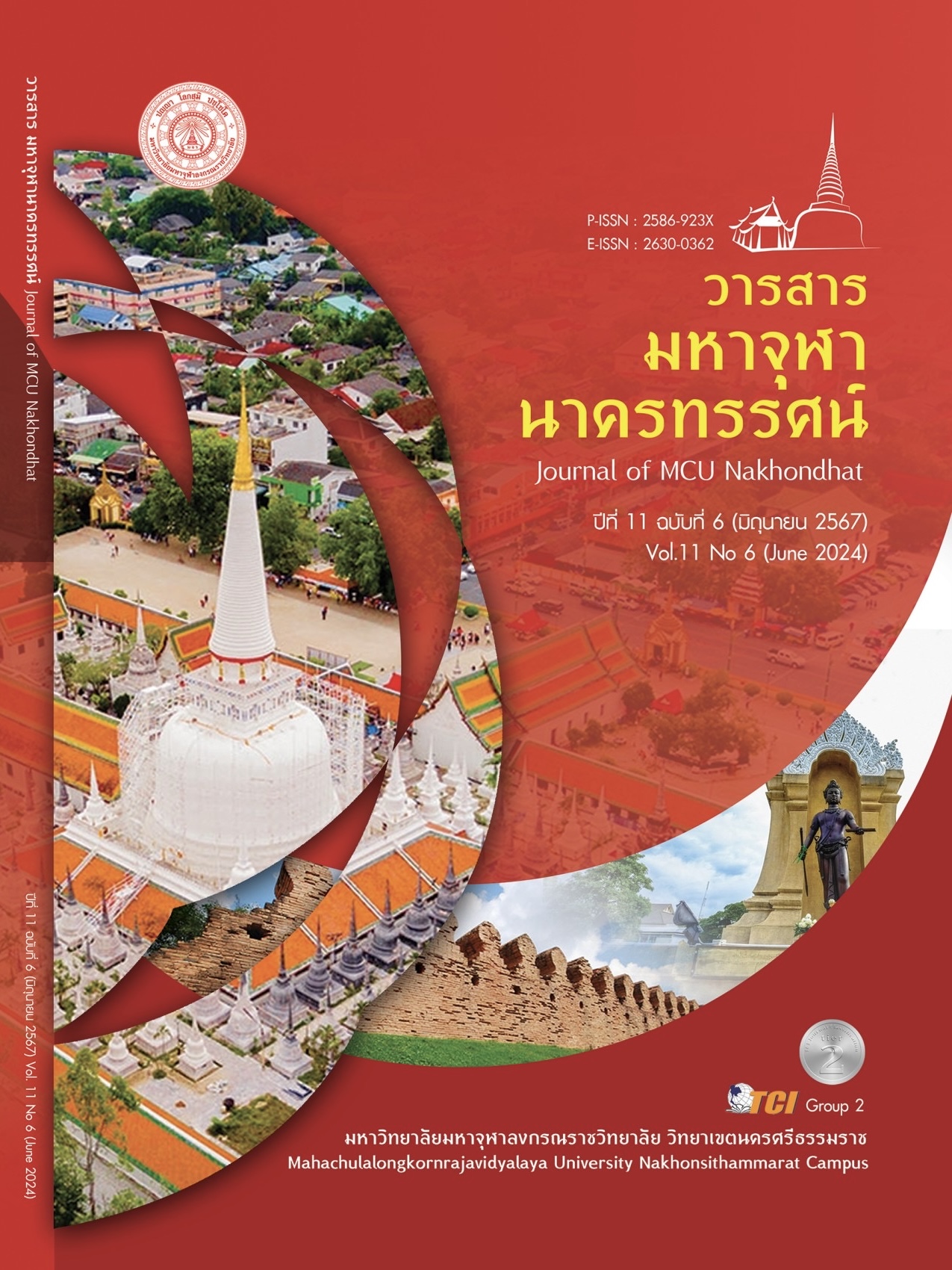THE SUCCESS FACTORS OF TEAM SPORTS FOR UNIVERSITY ATHLETE OF THAILAND
Main Article Content
Abstract
The objectives of this research were to 1) Study the concerning personal motivation; physical fitness; mental fitness; the athletes potential and skills; policy and supporting; sports team of coaches and sponsorship; and sports facilities. Furthermore, the researchers study 2) The factor analysis of the success factors of team sports for University athlete of Thailand. This is survey research, and used to conceptual framework of the success factors of team sports. The sample was 401 athletes of University. The instrument used for data collection was questionnaire. Testing for quality, the researchers found that the instruments evinced reliability at the levels of 0.97. The researchers analyzed the data collected in terms of frequency, percentage, mean and standard deviation. In addition, the exploratory factor analysis by orthogonal rotation with varimax method was used to extract factors. The researchers found that 1) Athletes of University exhibited levels of opinions regarding personal motivation at a highest level and in three aspects at a high level in the following descending order of means: sports team of coaches and sponsorship; policy and supporting; and sports facilities. Furthermore, the opinions concerning behavior to practicum regarding mental fitness; the athletes potential and skills and physical fitness at a level often. 2) There were the success factors of team sports for University athlete of Thailand ten components, described by 72 variables. Loading factors ranged from .405 to .830. They were explanatory of variance at 62.77 percent. The name of components were as follows: 1) Sports team of coaches; 2) Sports facilities; 3) Physical fitness; 4) The athletes potential and skills; 5) Policy and supporting; 6) Mental fitness; 7) Stress management; 8) Personal intrinsic motivation; 9) Personal extrinsic motivation; and 10) Sport potential development.
Article Details

This work is licensed under a Creative Commons Attribution-NonCommercial-NoDerivatives 4.0 International License.
References
กรณ์ทิพย์ ลิ่มนรรัตน์. (2565). จิตวิทยาการกีฬา. วารสารสถาบันวิจัยและพัฒนา มหาวิทยาลัยราชภัฏชัยภูมิ, 4(3), 1-16.
กรมพลศึกษา กระทรวงการท่องเที่ยวและกีฬา. (2556). จิตวิทยาการกีฬา. กรุงเทพมหานคร: สำนักงานกิจการโรงพิมพ์องค์การสงเคราะห์ทหารผ่านศึกในพระบรมราชูปถัมภ์.
กรมพลศึกษา กระทรวงการท่องเที่ยวและกีฬา. (2560). คุณลักษณะทางจิตใจของนักกีฬาเยาวชนไทย: ทักษะการจัดการความเครียดทางการกีฬา. กรุงเทพมหานคร: กระทรวงการท่องเที่ยวและกีฬา.
กฤชญา พุ่มพิน. (2565). ปัจจัยแห่งความสำเร็จของทีมกีฬาตะกร้อหญิงในการแข่งขันกีฬามหาวิทยาลัยแห่งประเทศไทย. วารสารสังคมศาสตร์ มหาวิทยาลัยมหามกุฏราชวิทยาลัย, 5(2), 1-25.
เกษม ช่วยพนัง. (2562). คุณลักษณะของหัวหน้าทีมกีฬา. วารสารวิชาการ มหาวิทยาลัยราชภัฏพระนคร, 10(2), 345-356.
เชาวรัตน์ เขมรัตน์ และคณะ. (2565). อิทธิพลของความเชื่อมั่นทางกีฬาที่ส่งผลต่อความสำเร็จในการแข่งขันกีฬา. วารสารวิทยาศาสตร์และเทคโนโลยี มหาวิทยาลัยเกษตรศาสตร์, 1(3), 24-32.
ณัฐกานต์ ขันทอง. (2562). การพัฒนารูปแบบการบริหารด้านกีฬาโรงเรียนกีฬาในประเทศไทย. ใน ดุษฎีนิพนธ์การศึกษาดุษฎีบัณฑิต สาขาวิชาสุขศึกษาและพลศึกษา. มหาวิทยาลัยศรีนครินทรวิโรฒ.
บุญใจ ศรีสถิตย์นรากูร. (2547). ระเบียบวิธีการวิจัยทางพยาบาลศาสตร์ (พิมพ์ครั้งที่ 3). กรุงเทพมหานคร: บริษัท ยูแอนด์ไอ อินเตอร์มีเดีย จำกัด.
พลากร ชาญณรงค์. (2565). รูปแบบการจัดการสิ่งอำนวยความสะดวกทางกีฬาของมหาวิทยาลัยราชภัฏ. ใน ปรัชญาดุษฎีบัณฑิต สาขาวิชาการจัดการกีฬา. มหาวิทยาลัยนเรศวร.
ภูษณพาส สมนิล. (2558). จิตวิทยาการกีฬาและการออกกำลังกาย. ใน เอกสารประกอบการสอนวิชาจิตวิทยาการกีฬาและการออกกาลังกาย. คณะวิทยาศาสตร์ มหาวิทยาลัยราชภัฏอุดรธานี.
มหาวิทยาลัยเกษตรศาสตร์. (2567). สูจิบัตรการแข่งขันกีฬามหาวิทยาลัยแห่งประเทศไทย ครั้งที่ 49 นนทรีเกมส์ 2567. เรียกใช้เมื่อ 25 มกราคม 2567 จาก https://kps.ku.ac.th/nontrigames/index.php/
สมบัติ เกตุสม และคณะ. (2557). การศึกษาปัจจัยที่มีผลต่อความสำเร็จของนักกีฬามหาวิทยาลัย เทคโนโลยีราชมงคลรัตนโกสินทร์ในการเข้าร่วมการแข่งขัน กีฬามหาวิทยาลัยแห่งประเทศไทย ครั้งที่ 41 ณ จังหวัดขอนแก่น. ใน รายงานการวิจัย. มหาวิทยาลัยเทคโนโลยีราชมงคลรัตนโกสินทร์.
สำนักงานสภาพัฒนาการเศรษฐกิจและสังคมแห่งชาติ. (2562). แผนแม่บทภายใต้ยุทธศาสตร์ชาติ (14) ประเด็น ศักยภาพการกีฬา (พ.ศ. 2561-2580). เรียกใช้เมื่อ 22 เมษายน 2566 จาก http://nscr.nesdc.go.th/
สืบสาย บุญวีรบุตร และลัดดา เรืองมโนธรรม. (2558). ระบบการดำเนินการและปฏิบัติงานในการพัฒนานักกีฬาเป็นเลิศของประเทศไทยสู่ความยั่งยืน ต่อเนื่อง และมีประสิทธิผล. วารสารวิทยาศาสตร์การกีฬาและสุขภาพ, 16(3), 1-14.
สุรศักดิ์ อมรรัตนศักดิ์ และคณะ. (2559). ระเบียบวิธีวิจัยทางการศึกษา (พิมพ์ครั้งที่ 3). กรุงเทพมหานคร: สำนักพิมพ์ศูนย์ส่งเสริมวิชาการ.
อัศวิน จันทรสระสม และกรรณิการ์ อินชะนะ. (2564). ปัจจัยที่สัมพันธ์ต่อความสำเร็จของนักกีฬาที่เข้าร่วมการแข่งขันกีฬาวอลเลย์บอลไทยแลนด์ลีค 2021. วารสารวิชาการวิทยาลัยสันตพล, 7(2), 74-84.
อัษ แสนภักดี. (2558). แนวคิดการจัดการกีฬาเพื่อความเป็นเลิศในสถาบันอุดมศึกษาของรัฐ. วารสารศิลปศาสตร์และวิทยาการจัดการ, 2(2), 173-201.
Cahill, J. et al. (2018). Addressing teamwork problems in healthcare: lessons learned from aviation and sport. British Journal of Healthcare Management, 24(9), 448-457.
Durovic, D. et al. (2020). Psychological aspect of motivation in sport achievement. Physical Education and Sport, 18(20), 465-474.
Gano-Overwa, L.A. et al. (2024). Personal and situational factors that influence coaches’ ability to care. Sport and Exercise Psychology. เรียกใช้เมื่อ 15 February 2024 จาก https://www.tandfonline.com/doi/full/10.1080/02640414.2024.2308412?
Halldorsson, V. et al. (2017). Teamwork in sport: A sociological analysis. Sport in Society, 20(9), 1-16.
McEwan, D. & Crawford, K. (2022). Why does teamwork execution break down? Experiences of university team sport athletes. Sport, Exercise, and Performance Psychology. เรียกใช้เมื่อ 15 May 2023 จาก https://www.researchgate.net/publication/359073208
Nova, A. et al. (2023). Analysis of Factors Affecting Policy Development of Achievement Sports in Aceh Province. International Journal of Human Movement and Sports Sciences, 11(5), 1121-1131.
Saward, C. et al. (2024). Motivational profiles and their relation to wellbeing, burnout, and dropout intentions in university football players in the UK: A mixed methods approach. Psychology of Sport & Exercise, 71, 1-13.
Trotter, M.G. et al. (2021). Social Support, Self-Regulation, and Psychological Skill Use in E-Athletes. Frontier Psychology, 2021(12), 722030.


